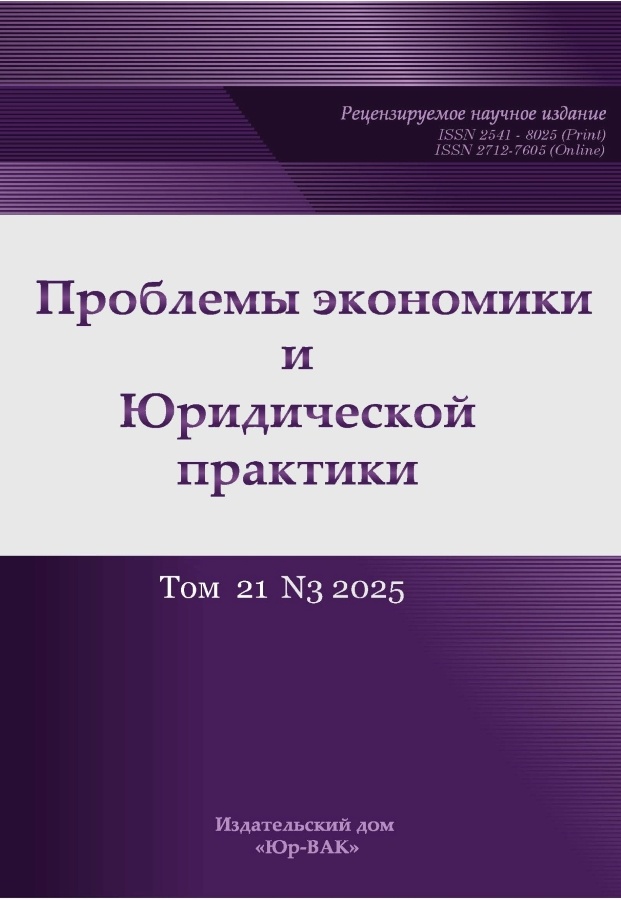On the Issue of Digitalization of the Russian Budget Ecosystem
- Authors: Savostyanova S.A.1
-
Affiliations:
- Financial University under the Government of the Russian Federation
- Issue: Vol 21, No 3 (2025)
- Pages: 17-22
- Section: Public Law (State and Legal Sciences)
- URL: https://journals.eco-vector.com/2541-8025/article/view/687992
- EDN: https://elibrary.ru/DKLKDK
- ID: 687992
Cite item
Abstract
The article considers current issues of digitalization of the Russian budget ecosystem as a key element of modern public administration. The advantages of introducing digital technologies into the processes of budget planning, execution and control are studied, including increasing transparency, efficiency and reducing corruption risks. Particular attention is paid to the legal problems of digitalization of the budget ecosystem. The purpose of the article is to analyze the current state of digitalization of the budget ecosystem, identify key challenges and suggest areas for further development. The author draws attention to the fact that digitalization of the budget ecosystem, as a key tool for transforming public finance management, should be considered in two aspects: digitalization as a way of reflecting budget processes in electronic format and as a method of transforming the budgetary activity itself. The article concludes that for the effective implementation of measures to digitalize the budget ecosystem, it is necessary to improve budget legislation, supplementing it with separate provisions regulating the procedure and conditions for the use of digital technologies, which should contribute to the creation of a comprehensive legal regulation of the area in question. Today, individual issues of the use of electronic technologies in the budgetary environment are regulated only in specific areas, which requires additional legislative development.
Full Text
About the authors
Svetlana A. Savostyanova
Financial University under the Government of the Russian Federation
Author for correspondence.
Email: sarudenko@inbox.ru
SPIN-code: 2514-1043
Cand. Sci. (Law), Associate Professor at the Department of International and Public Law
Russian Federation, MoscowReferences
- Ablyazov T. Kh. Directions for improving the mechanism of openness and transparency of state and municipal budget policy in the context of the digital economy / T. Kh. Ablyazov, I. S. Petrov // Modern Economy Success. —2020. —No. 4. —Pp. 12–17. —EDN TVRLJC.
- Blizkiy R. S. Modernization of treasury budget execution in the context of digitalization / R. S. Blizkiy, Yu. S. Lebedinskaya, A. S. Khmelevskoy // Fundamental research. —2023. —No. 11. —Pp. 8–14. —doi: 10.17513/fr.43510. —EDN VBTYXE.
- Busalova S. G. Internal state financial control in the context of digitalization of the economy / S. G. Busalova, E. R. Gorchakova // Bulletin of the Altai Academy of Economics and Law. —2018. —No. 7. —P. 34–38. —EDN YUDSQH.
- Vdovina S. P. Transparency of the budget of municipalities / S. P. Vdovina // Current scientific research in the modern world. —2020. —No. 12-6 (68). —P. 47–50. —EDN GRLBPF.
- Zabralova O. S. General trends in the digitalization of the budget process in the Russian Federation / O. S. Zabralova // Current problems of Russian law. —2024. —Vol. 19, No. 11 (168). —P. 11–20. —doi: 10.17803/1994-1471.2024.168.11.011-020. —EDN BIEIXC.
- On the Formation of an Electronic Budget System: Russian and Foreign Experience / E. A. Lavrenteva, A. V. Brovkina, S. A. Kotov, A. G. Zhelamskaya // Transport Business of Russia. —2023. —No. 1. —P. 96–100. —doi: 10.52375/20728689_2023_1_96. —EDN RMXHSF.
- Karataeva G. E. Digital Transformation of the Budget Process in Russia / G. E. Karataeva, S. V. Chernova // Issues of Innovative Economics. —2021. —Vol. 11, No. 3. —P. 943–960. —doi: 10.18334/vinec.11.3.112336. —EDN QCIJBL.
- Kirillova, S. S. Advantages of Digitalization of Budget Planning at the Municipal Level / S. S. Kirillova, A. S. Rodyukova // Science and Education. —2020. —Vol. 3, No. 3. —P. 220. —EDN HGJWCE.
- Konyukhova D. I. Reforming the System of Budget Payments / D. I. Konyukhova // Issues of Russian and International Law. —2017. —Vol. 7, No. 7A. —P. 263–273. —EDN YKYUBA.
- Omelyokhina N. V. Digitalization of the budgetary sphere as a subject of legal influence / N. V. Omelyokhina // Journal of Russian Law. —2020. —No. 8. —P. 127–140. —doi: 10.12737/jrl.2020.099. —EDN YDFNMR.
- Rozhkov E. V. Theoretical foundations of institutional traps in the implementation of digitalization / E. V. Rozhkov // Issues of regional economics. —2022. —No. 2 (51). —P. 134–139. —EDN UUCJPD.
- Tishchenko E. S. Problems of tax administration in the context of the digital economy / E. S. Tishchenko, Yu. A. Kleymenova, K. I. Tliy // Business. Education. Law. —2020. —No. 3 (52). —P. 229–233. —doi: 10.25683/VOLBI.2020.52.355. —EDN XCJHRV.
- Shibanova A. A. Unified information system «Electronic budget» as a tool for digitalization of budgetary legal relations / A. A. Shibanova // Economy and business: theory and practice. —2023. —No. 2(96). —P. 321–323. —doi: 10.24412/2411-0450-2023-2-321-323. —EDN ZLTEDQ.
- Eriashvili N. D. Digitalization of the budget process in a municipality / N. D. Eriashvili, T. Sh. Tinikashvili // Audit statements. —2022. —No. 4. —P. 124–129. —doi: 10.17686/17278058_2022_4_124. —EDN BQJNNS.
- Yanchenko E. V. Tax regulation as a factor of competitiveness in the context of digitalization of the economy / E. V. Yanchenko // Issues of Innovative Economics. —2021. —Vol. 11, No. 2. —P. 537–552. —doi: 10.18334/vinec.11.2.112053. —EDN QPEPPP.
Supplementary files









